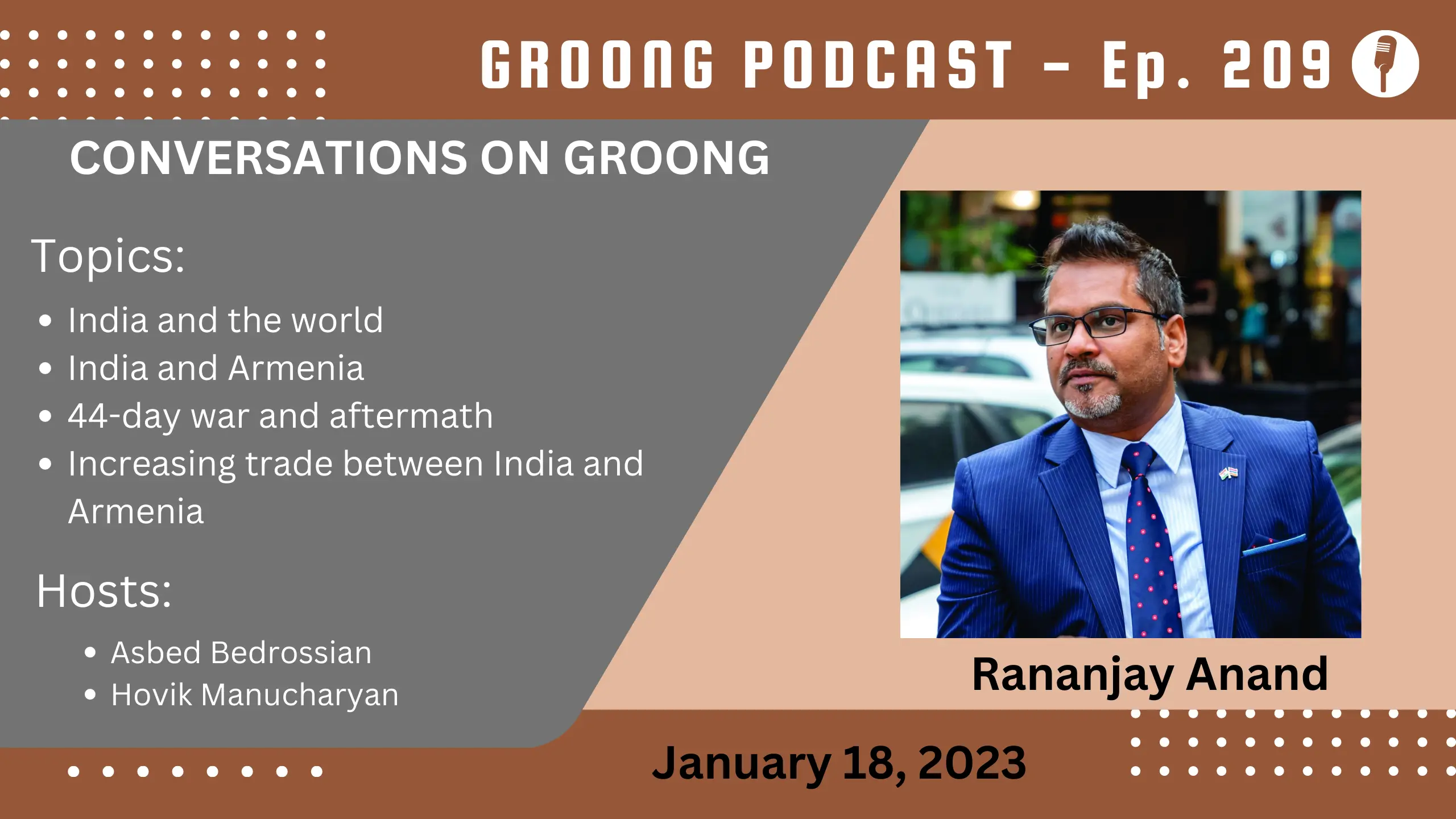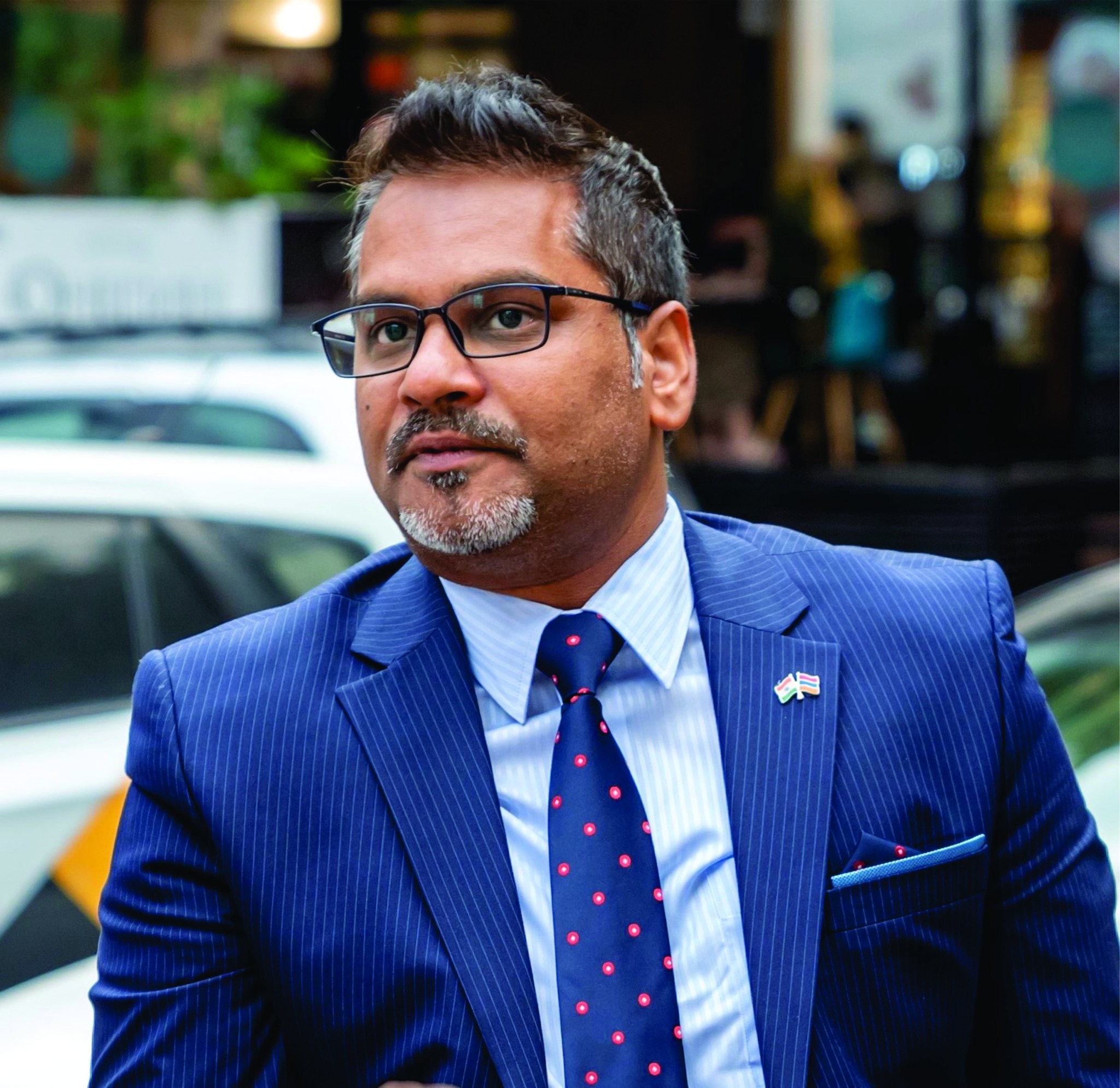
Conversations on Groong - Jan 18, 2023
Guest:
Topics:
- Indo-Armenian Friendship NGO
- The Indian Community in Armenia
- Where India sees itself on the world stage
- Drivers for Indian-Armenian Relations
- How to improve economic and trade relations
- The Hope & Promise of Indian Armenian Friendship
Episode 209 | Recorded: January 18, 2023
Show Notes
Discussion
Mr. Anand, since this is your first time on our show, we’re interested in hearing more about you and your involvement with Armenian relations or the involvement of Armenians in your life.
- What is the Indo-Armenian Friendship NGO that you co-founded?
- How many members does it have?
- Where does it get its funding?
- Do you get support from the Indian embassy or the MFA?
- Are there other NGOs that support the Indian community in Armenia?
- How large is the Indian community in Armenia, and what ties do you maintain with them?
- What attracted you to working in the field of relationship building between the two nations?
India on the World Stage
India is one of the largest countries in the world, and is barely second only to China as the most populous country in the world. In fact, within a few years India is expected to overtake China in this area. At the same time, India is the most populous, or largest democracy in the world, and a major regional and nuclear power, with significant technology and defense industries. So it is quickly rising to become a world power, which other major powers can no longer ignore or take for granted. Since the start of the war in Ukraine, Indian-Russian partnership has further developed. India has increased its consumption of Russian gas. India is also a key member of BRICS, which is set to grow much more in influence as a testament to the rearrangement of the world geopolitical order.
- Where does India see itself on the world stage in the coming few years and decades?
- Why is India not a permanent UN Security Council member?
India and Armenia
India and Armenia are seemingly natural allies. On the diplomatic side, Armenia is the only country in the Caucasus that has a Friendship and Cooperation Treaty with India (since 1995). But in terms of economy, for whatever reason, Indian-Armenian trade isn’t as great as it could be.
However, since late October 2021 there is renewed energy in developing economic, as well as military relations between the two countries, as Indian Foreign Minister Subramanyam Jaishankar, made a historic, first-ever diplomatic visit to Armenia.
Meanwhile, India’s adversary Pakistan has been very active in developing its relations with Armenia’s enemies, Turkey and Azerbaijan, and continues to invest militarily in these relationships.
We’ve discussed on this show the North-South Corridor of world trade, which takes commerce to and from the Persian Gulf to the Black Sea, essentially connecting the economies of India and South Asia to Europe. This corridor theoretically would pass through Iran, and Armenia, and Georgia in the South Caucasus.
- What are the main reasons why India is interested in strengthening its relationship with Armenia?
- Are the factors purely economic, or do they have strategic military objectives as well, namely to counter Pakistan, Turkey, and combating terrorism?
Post 44-Day War Stance
During the 44-day war in Nagorno Karabakh in 2020, Pakistan threw its full support behind Azerbaijan’s vicious aggression against a peaceful population. During and since that war, the world has mostly paid lip service to the war crimes and humanitarian crisis unfolding in Artsakh, and the need of the indigenous Armenian population. India has been a rare exception. Recently, India has not only been unambiguous in its support and sympathy for Armenia, but has also started helping Armenia rearm itself, and supplying it with Indian-made weapons to defend itself.
- What are the drivers behind India’s policy?
Increasing Trade Relations
Improving geopolitical ties between India and Armenia can be greatly supported and augmented by public-private partnerships, with the help of private citizens and businessmen such as yourself. Despite being one of the most populous and largest countries in the world, India is not one of the top 5 of Armenia’s trade partners. Yet India is Azerbaijan’s 4th largest trade partner.
- How do we get more business people in India and Armenia to invest in bilateral trade?
- Are there investment funds, or public-private partnership opportunities, to help support such activities?
In 2021 Armenia imported from India around $89 million worth of products, while India imported from Armenia around $122 million; most of it was in gold, or other metals, gems, precious stones. This will go up in 2023, given the defense deal that was signed in September 2022.
- Where do you expect Indian-Armenian trade to be, let’s say in 3-5 years?
Wrap-up
We hope you found our Conversations on Groong helpful, we invite your feedback and your suggestions. You can find us on most social media and podcast platforms. Thanks to Laura Osborn for the music on our podcasts.
Guests

Hosts

Asbed Bedrossian
Asbed Bedrossian is an IT professional, and for years oversaw the central IT enterprise infrastructure and services at USC. His decades of experience spanned across IT strategy, enterprise architecture, infrastructure, cybersecurity, enterprise applications, data center operations, high performance computing, ITSM, ITPM, and more.
Asbed founded the Armenian News Network Groong circa 1989/1990, and co-founded the ANN/Groong podcast in 2020.

Hovik Manucharyan
Hovik Manucharyan is an information security engineer who moved from Seattle to Armenia in 2022. He co-founded the ANN/Groong podcast in 2020 and has been a contributor to Groong News since the late 1990s.
Disclaimer: The views expressed by Hovik Manucharyan on the ANN/Groong podcast are his own and do not necessarily reflect the opinions of his employer or any other organization.